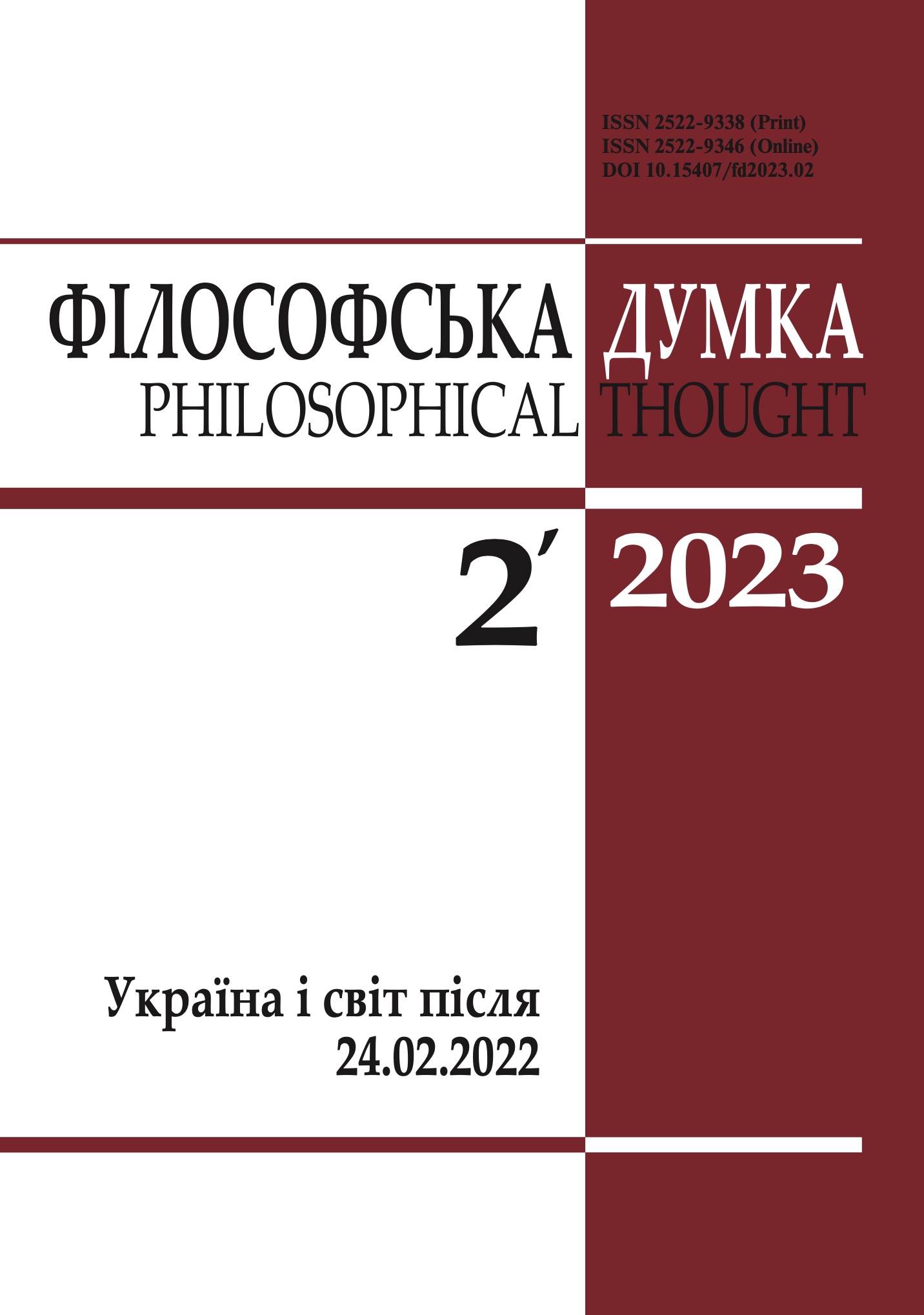Natural kinds and a posteriori necessities: Putnam pro Kripke, Putnam versus Kripke
LOGIC, METHODOLOGY AND PHILOSOPHY OF SCIENCE
DOI:
https://doi.org/10.15407/fd2023.02.159Keywords:
meaning, conceptualism, descriptivism, internalism, externalism, natural kind, a posteriori necessary truthAbstract
Most contemporary analytic philosophers of language and mind accept the view that there is a wide class of terms, “natural kind terms”, which includes names of substances (the most common example is “water”), of species of animals, and of many other kinds of things in nature, whose meaning and reference is determined in the way explained by the theory developed in the 1970s by Saul Kripke and Hilary Putnam. The theory is often referred to as “the Kripke-Putnam theory” and is supposed to have such achievements as the overthrow of the earlier dominant Fregean theory of word-meanings (dubbed “descriptivism” by Kripke) as determined by the concepts in our minds, providing support for the “externalist” approach to linguistic meanings (in line with Putnam’s claim that “"Meanings" just ain’t in the head”), and the discovery that there is a wide class of truths (such as that water is H20) that are both a posteriori and necessary. Although the priority in the development of this theory belongs to Kripke, it could hardly gain such a wide acceptance without contributions by Putnam, which turned out to be very influential. However, the habitual idea of “the Kripke-Putnam theory”, as one theory, tends to play down the differences between Putnam’s and Kripke’s approaches and to hush up the fact that in his late works, of 1983 and 1990, Putnam revised and abandoned pretty much of his “Kripkean” views of 1970-ies; in particular, repudiated the pride of Kripke’s theory, the idea of necessary a posteriori truths. This article makes critical analysis and evaluation of Putnam’s ideas and arguments usually credited as important contributions to “the Kripke-Putnam theory”, and highlights the main points of the revision in late Putnam’s works. The case is made that Putnam's famous argument for externalism about meanings, the Twin-Earth thought experiment, is question-begging, fails to do justice to likely changes in the meanings of words with the development of knowledge, and conflicts with the linguistic practice in the relevantly similar case of “jade”. Putnam's argument for externalism from the division of linguistic labour is not cogent too, because “semantic deference” is itself a matter of what is there in “heads” - of some (non-expert) heads deferring to other (recognised as expert) heads. Eventually, on close inspection and in the light of Putnam's later reexplanation and revision, his account of meaning and reference turns out to be a sophisticated variety of conceptualism/internalism.
References
Ayer, A. J. (1983). Philosophy in the Twentieth Century. New York: Vintage Book.
Chalmers, D. (1996). The Conscious Mind, New York: Oxford University Press.
Chalmers, D. (2010b). The Two-Dimensional Argument Against Materialism. In: D. Chalmers, The Character of Consciousness (pp. 141-205). New York: Oxford University Press.
https://doi.org/10.1093/acprof:oso/9780195311105.003.0006
Dummett, M. (1973). Frege: Philosophy of Language. London: Duckworth.
Dupré, J. (1981). Natural Kinds and Biological Taxa. Philosophical Review, 90, 66-90.
https://doi.org/10.2307/2184373
Dupré, J. (1993). The Disorder of Things: Metaphysical Foundations of the Disunity of Science. Cambridge MA: Harvard University Press.
Frege, G. (1892). Über Sinn und Bedeutung. Zeitschrift für Philosophie und philosophische Kritik, 100, 25-50.
Frege, G. (1952). On Sense and Reference. Trans. by M. Black. In: P. Geach and M. Black (Eds.), Translations from the Philosophical Writings of Gottlob Frege (pp. 56-78). Oxford: Blackwell.
Hacking, I. (2007a). Natural Kinds: Rosy Dawn, Scholastic Twilight. Royal Institute of Philosophy Supplement, 61, 203-239.
https://doi.org/10.1017/S1358246107000203
Hacking, I. (2007b). Putnam's Theory of Natural Kinds and Their Names is Not the Same as Kripke's. Principia, 11(1), 1-24.
Kripke, S. (1972). Naming and Necessity. In Davidson, D. & Harman, G. (Eds.), Semantics of Natural Language (pp. 253-355). Dordrecht: Reidel.
https://doi.org/10.1007/978-94-010-2557-7_9
Mellor, D. (1977). Natural Kinds. The British Journal for the Philosophy of Science, 28(4): 299-312.
https://doi.org/10.1093/bjps/28.4.299
Plato. (1892). Phaedrus. In: Jowett, B. (transl.), Dialogues of Plato. Vol. 1 (pp. 391-489). Oxford, New York: Oxford University Press.
Putnam, H. (1973). Meaning and Reference. The Journal of Philosophy, 70(19): 699-711.
https://doi.org/10.2307/2025079
Putnam, H. (1975). The Meaning of "Meaning". Minnesota Studies in the Philosophy of Science, 7, 131-193.
https://doi.org/10.1017/CBO9780511625251.014
Putnam, H. (1983). Possibility and Necessity. In^ H. Putnam, Realism and Reason (Philosophical Papers, Volume 3) (pp. 46-68). New York: Cambridge University Press.
https://doi.org/10.1017/CBO9780511625275.005
Putnam, H. (1990). Is Water Necessarily H2O? In: H. Putnam, Realism with a Human Face (pp. 54-79, 325-327). First Harvard University Press.
Rosenberg, J. (1994). Beyond Formalism: Naming and Necessity for Human Beings. Philadelphia: Temple University Press.
Sepetyi, D. (2020). Being Sceptical about Kripkean A Posteriori Necessities and Natural Kinds. Filosofska Dumka, (6), 98-117.
https://doi.org/10.15407/fd2020.06.098
Sepetyi, D. (2022). Anti-Kripkean Intuitions: Conceptualism Versus Essentialism. Filosofska Dumka, (1), 98-114.
https://doi.org/10.15407/fd2022.01.098
Stroll, A. (2000). Twentieth Century Analytic Philosophy. New York: Columbia University Press.
Zemach, E. (1976). Putnam's Theory of the Reference of Substance Terms. The Journal of Philosophy, 73(5): 116-127.
Downloads
-
PDF
Downloads: 189
Published
How to Cite
Issue
Section
License
Authors who publish with this journal agree to the following terms:
- Authors retain copyright and grant the journal right of first publication.
- Authors are able to enter into separate, additional contractual arrangements for the non-exclusive distribution of the journal's published version of the work (e.g., post it to an institutional repository or publish it in a book), with an acknowledgement of its initial publication in this journal.
- Authors are permitted and encouraged to post their work online (e.g., in institutional repositories or on their website) prior to and during the submission process, as it can lead to productive exchanges, as well as earlier and greater citation of published work (See The Effect of Open Access).


